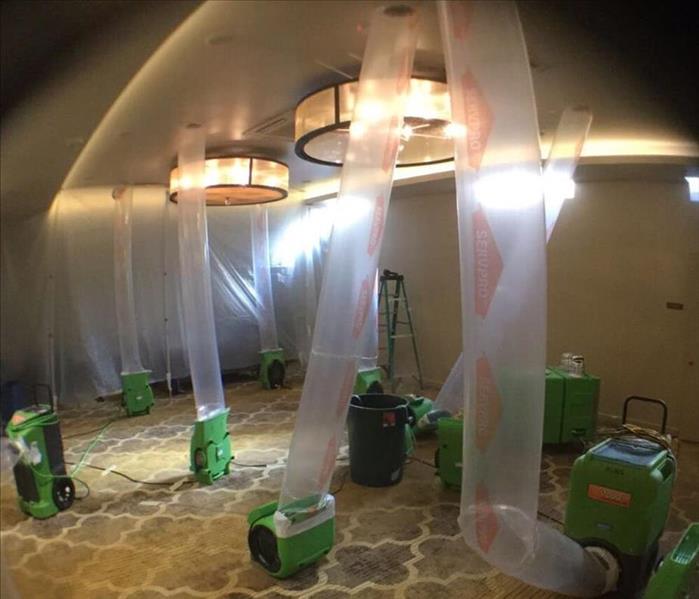Commercial water damage in Northwest Iowa
12/9/2019 (Permalink)
 This commercial property suffered a major water loss and our team set up temporary ducts to help promote the drying process and prevent more damage.
This commercial property suffered a major water loss and our team set up temporary ducts to help promote the drying process and prevent more damage.
All commercial buildings are unique in structure, design, and even materials used when constructing the building. One thing remains constant however, the potential for experiencing a water loss at some point. Even small problems such as minor roof or pipe leaks can lead to major issues including mold growth. With prolonged damage like that the value of your commercial property can quick diminish. Keep these things in mind when it comes to your commercial property...
- Mold can grow quickly after water damage
After water has affected a particular area, mold can grow in as little as 24 – 48 hours. All excess water and humid conditions should be dried out right away to prevent the risk of mold growth.
- Problems are not fixed if the water has dried out
Some property owners believe that once the water appears to have dried up that they are in the clear, that couldn't be farther from the truth. While water evaporates in the area, moisture will accumulate in the walls, ceiling, and even the floor below, promoting mold growth. If this happens, it’s important to call in a mold prevention specialist to conduct a deep inspection to make sure that mold hasn’t already infected your property or spread to other areas.
- Different building materials require different cleaning methods
The same restoration process cannot be used for all building materials. Hard surfaces like concrete can be salvaged but porous materials like cellulose insulation and flooring materials will need to be removed and replaced.
- Water extraction is the best step to restoring water damage
Excess water can lead to costly repairs in damaged material if not extracted immediately. Experienced water damage restoration professionals know exactly how to remove excess water in emergency situations like flooding or burst pipes. Hiring these specialists will also ensure that all hidden water damage and moisture from behind the walls and underneath the floors is also removed properly to prevent the risk of mold growth.
- Time is everything
As soon as you find water damage on your property, taking the necessary steps right away can make a big difference in financial costs. Simply knowing the basic first steps during an emergency can prevent the damage from spreading further.
- Contact your insurance company right away if you find water damage
It’s imperative to call your insurance company immediately after finding water damage. The insurance company can also guide you through the first steps to prevent the damage from spreading.
- A separate flood insurance policy may also be necessary
Insurance companies may offer flood insurance in addition to your policy. This may be necessary especially if you live in a flood zone. In any case, contact your insurance provider to see if this is necessary for you and whether you need additional coverage.
- Insurance policies may not cover all types of water damage
While some situations are covered by insurance policies, others are excluded for various reasons. For example, flood damage and mold growth are usually not a covered loss unless you have flood insurance on your policy, even then there may be some exclusions. It is best to speak with your agent in advance to understand what your policy can and cannot do in the event of a loss.
- There are different types of water contamination
Most insurance professionals see water damage as different types of contamination: white water, grey water, and black water. The processes associated with cleaning up each type of damage will be different. Most business owners hope to see white water as the restoration process becomes much more cut and dry while black water means there will be a number of materials that must be disposed of due to contact with water that may contain contaminants such as pesticides, pathogens, and other toxigenics.
- Even small leaks can lead to big problems
If not checked frequently, minor plumbing leaks or appliance malfunctions can lead to big water damage problems. If the plumbing is not frequently maintained, your insurance company may not cover the cost of everyday wear and tear.
- Roof leaks are a common source of water damage in commercial buildings
Even small leaks in a commercial roof can lead to major problems for the business. Even if it was just installed, a bad storm can still penetrate through the materials and spread damage. This is especially common with areas experiencing strong winds, freezing temperatures, and hail damage.
- Building maintenance can prevent water damage disasters
It’s important to check or have the building checked on a frequent basis. These water damage preventative tasks should include gutter, roof, and plumbing inspections. You may also want to have a professional inspect the building once or twice each year to ensure everything is in proper condition.
Call SERVPRO of Spencer & Iowa Great Lakes for your Commercial Restoration Needs!
712-262-4379






 24/7 Emergency Service
24/7 Emergency Service